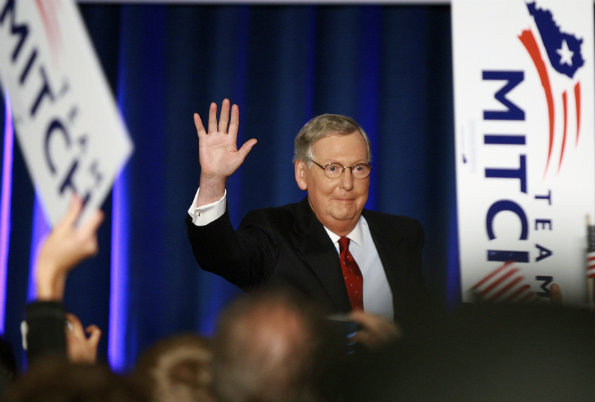THE results are not counted and, in Alaska, they may not be for a while—but that does not matter. Republicans have their majority. The party needed a net gain of six and started with three in the bag. By the time Colorado was called for Cory Gardner it looked like there would only be one winner. The scale of the victory now looks impressive. The GOP held on in Kansas, where Pat Roberts faced a strong challenge from Greg Orman, an independent, and won in North Carolina, where the speaker of the statehouse, Thom Tillis, beat Kay Hagan. Washington’s herdlike political reporters (this one included) failed to notice there was a tight race on their doorstep in Virginia, where but for the presence of a libertarian candidate on the ballot Ed Gillespie might have beaten Mark Warner, the incumbent.
Democrats can rightly point to a map that did their side no favours—all but one state in what was once the Confederacy chose a Senator on November 4th (Florida is the odd one out)—and to the woeful mid-term results in the past from the party that held the presidency. Yet Democrats also lost in some places the party thinks of as its backyard: Maryland now has a Republican governor, something that has only happened once since Spiro Agnew left office in 1969. The biggest gubernatorial race of the night, in Florida, was won by a Republican, Rick Scott.
What will the party do with the Congress that it will control for the first time in a decade? At his victory party in Kentucky, Mitch McConnell (who will mark his 30th year in the Senate by becoming majority leader) was conciliatory. “Just because we have a two-party system doesn’t mean we have to be in perpetual conflict,” he said. Yet perpetual conflict is just what some of his colleagues have in mind. Kentucky’s other Senator, Rand Paul, promised that a Republican-controlled Senate would send the president bills he would hate, including a repeal of the Affordable Care Act.
Mr McConnell is already being proclaimed America’s second most powerful politician, but he will be constrained. Republicans will probably end up with 53 or 54 seats, short of the supermajority needed to overide a filibuster from the minority party. This will allow Democrats to use procedural trickery to frustrate him. Nor will incoming GOP senators necessarily do his bidding. Tom Cotton, who beat Mark Pryor in Arkansas, backed last year’s government shutdown from the House while Mr McConnell was busily trying to end it in the Senate. Neither Joni Ernst, Iowa’s new Senator, nor Mr Tillis of North Carolina are likely to do as they are told too often.
The first test of how the new Senate will operate will come before these folks take their seats in January. Most of the federal government is operating under a continuing resolution that expires on December 11th. Mr McConnell will want to make sure there is no repeat of last year’s mess. Further off there may be deals to be done with the president on trade, the taxation of companies and perhaps more visas for highly skilled workers. But anyone who expects America’s bigger challenges to be solved now that the Senate has flipped has not been paying attention to how divided government works now.
SOURCE: THE ECONOMIST














